A.K. & Sanjay Agarwal
MDN Edify Education, Hyderabad
Both commerce graduates of Osmania University, siblings Anjani Kumar (AKA) and Sanjay Agarwal (SA) are directors of the Hyderabad-based MDN Edify Education Pvt. Ltd. Since the company was incorporated in 2009, it has signed content and curriculum provision and management contracts with 164 preschools and 16 K-12 schools with an aggregate enrollment of over 64,000 students countrywide, run under the Edify brand. The Agarwal brothers ventured into education in 2003 with the state-of-the-art CBSE, IBO (Geneva) and CIE (UK)-affiliated DRS International School, Hyderabad.
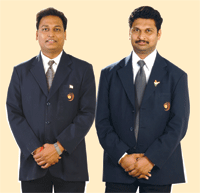 What’s the history of MDN Edify?
What’s the history of MDN Edify?
AKA: My father Sri Dayanand Agarwal, the promoter of Agarwal Packers and Movers, had a vision of setting up a school which would offer high quality education. During his journey, he realised the importance of an educated workforce and desired to establish a school. Building on his aspirations, in 2003 under the guidance of former Doon School headmaster Gulab Ramchandani, we promoted the DRS International School (DRSIS), Hyderabad, which is running to full capacity today.
After fulfilling my father’s vision of establishing DRSIS, we resolved to provide quality school education to children across the country. We chose the franchise route to attain our objective. Thus MDN Edify Education was born in 2009. We are happy to state that the Edify brand has gone international with the establishment of franchisees in Nepal and the Gulf region.
What were the major challenges and how did you meet them?
SA: Initially we faced problems in creating awareness among parents about our enquiry-based system of education. Secondly, we had a tough time finding quality teachers to adapt to our curriculum and deliver it to students in franchisee schools. By constantly meeting and educating groups of parents across the country, we succeeded in winning them over to our new concepts of teaching. Currently Edify Education is empanelled by CBSE to conduct training programmes for teachers and principals of CBSE-affiliated schools.
What are your future growth and development plans?
SA: By the year 2018, we expect to launch 250 preschools and 100 world-class K-12 schools across the country under the Edify Education brand.
Unwind/de-stress.
AKA: Spending time with children rejuvenates both body and mind.
SA: Long drives.
Ashish Rajpal
XSEED Education, Gurgaon
Ashish Rajpal is founder-managing director of XSEED Education (formerly iDiscoveri), which offers its XSEED programme to 1,000 schools with an aggregate enrollment of 400,000 children and 40,000 teachers. An alumnus of XLRI Jamshedpur, and the Harvard Graduate School of Education, in 2001 Rajpal forsook by-all-accounts a spectacular career as the worldwide marketing director of the Paris-based Groupe Danone, to return to India and promote XSEED..gif)
What prompted you to start XSEED?
In my growing years, I spent a lot of time in the hill areas which may have sparked a desire to accomplish something with a wide social impact. The birth of my own children was also a huge turning point and aroused my interest in education and how best to realise a child’s potential. Hence returning to India and venturing into education was a natural outcome.
What were your major early challenges?
During our early years, we realised that one-off teacher training workshops weren’t delivering the pedagogical changes we wanted in classrooms. And school managements particularly in the metros, were hesitant to experiment and adopt new pedagogies. Schools in tier-II and III cities were more receptive.
How did you overcome them?
I started teaching and found it was an incredibly difficult job. That’s when we realised that teachers require detailed instructions and hand-holding for lesson planning — something that one-off workshops can never do. The result was XSEED which equips teachers with detailed lesson plans on how to teach effectively, and tools to assess child-ren’s learning.
How helpful/enabling are the Central and state governments?
Not at all.
Future growth and development plans.
To create a visible, measurable global model that will enable all children to learn better to realise their potential. Our target is to serve 10 million children globally by 2020.
Unwind. Tennis, music, reading, writing and running.
Jasvinder Singh
ACTUniv Group, Ahmedabad
An electronics graduate of the MG Science Institute, Ahmedabad, Jasvinder Singh is founder-chief executive of the Ahmedabad-based ACTUniv Group (estb. 1989), engaged in providing computer training and English language learning products and services to government, corporate and education institutions. Over the years, ACTUniv has diversified into many verticals including e-learning development, technology implementation, software and multimedia training centres in India (mainly in Gujarat), and has installed the group’s popular Words Worth English language learning labs in over 2,500 schools and colleges countrywide, with an enrollment of 1 million-plus students. Moreover ACTUniv has completed IT training projects for the governments of Bahrain, and Bangladesh, and supp-orted private organisations in Sri Lanka, Singapore, and United Kingdom.
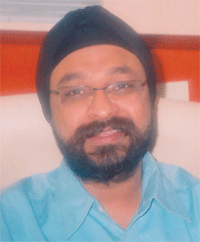 What prompted you to start ACTUniv?
What prompted you to start ACTUniv?
I found a lot of inadequacies in the way computer training was delivered to learners. The methodology replicated the age-old drill and test, and classroom exercise with mini-mal practice time. Despite the fact that computers were expensive, I took on the chal-lenge to provide one computer per learner, at affordable fees.
What were your major early challenges?
As a start-up, we had to compete with national-level IT training companies. Raising funds is always a major challenge for young entrepreneurs, as is retaining talent.
How did you overcome these challenges?
Through perseverance and hard work, we provided the best training and development platforms and beat the competition. We ploughed back all profits into expansion and today we are the #1 IT training company in Gujarat.
How helpful/enabling are the Central and state governments?
As we established a good reputation, the state government became increasingly facilitative and created opportunities for us to showcase our expertise and strengths. Some of our most successful projects have been in partnership with the Gujarat government. The Union government has empanelled us for providing skills development programmes for the masses.
Future growth plans.
We plan to increase users of our Words Worth English Language Labs from 1 million learners to 10 million annually. Very shortly, we will be launching an after-school web-based English language learning programme through our portal to engage with learners at home.
Unwind/de-stress. I love to travel, meet people and share ideas. I enjoy Sund-ays, mostly reserved for cooking with the family.
Mahesh Shetty
MT Educare Ltd, Mumbai
A science and education graduate of Mumbai University, Mahesh Shetty is the chairman and managing director of the Mumbai-based MT Educare Ltd (estb. 1988), the holding company of Mahesh Tutorials, a household name in supplementary and test prep examinations in western and south India. Currently MT Educare (revenue: Rs.154 crore in 2012-13) runs 222 learning centres in Maharashtra, Gujarat, Tamil Nadu, Karnataka, Punjab, Haryana, and Dubai with an aggregate enrollment of 80,000 students mentored by 1,200 teachers. MT Educare is listed on BSE and NSE..gif)
What prompted you to start Mahesh Tutorials?
I love inspiring students to bring out the best in them and help them succeed in their chosen career paths. I also wanted to offer a conducive environment for teachers, so they select teaching as a career of choice and not by default.
What were your major early challenges?
Although I worked in a small coaching institute before the inception of Mahesh Tutorials in 1988, raising finance from institutes and banks was an entirely new and challenging proposition given that I had no collateral. But some friends and relations contributed and helped me launch Mahesh Tutorials. Expansion into new geographies with self-funding posed cash flow challenges, as did finding lecturers and subject experts.
How did you confront these challenges?
Mahesh Tutorials was incorporated into MT Educare Pvt. Ltd in 2006. This corporatisation process by industry professionals created an attractive business model prompting the Mauritius-based Helix Investments to purchase a 30 percent stake in the year 2007-08. This growth capital fuelled our expansion in different geographies including Gujarat, Tamil Nadu & Karnataka. MT Educare has also made a foray into formal education by starting a pre-university college in Mangalore.
Future growth and development plans?
Over the next three years, MT Educare will focus on optimising the produc-tivity of established cent-res, and consolidate gro-wth in new geographies.
Unwind/de-stress. Designing study programmes for academics, skills building, and behavioural and attitudinal change.
Dr. Chenraj Roychand
Jain Group, Bangalore
Dr. Chenraj Roychand (formerly Jain) is founder chairman of the Jain Group of Institutions (JGI), which comprises 85 education institutions with an aggregate enrollment of 45,000 students in preschool, K-12, under-graduate and postgraduate education.
An entrepreneur, educationist and philanthropist who began his career as a salesman earning Rs.50 per month, Roychand promoted the first JGI institution — Sri Bhagawan Mahaveer Jain College — in Bangalore in 1989, and its first school — Jain International Residential School (JIRS) also in Bangalore — in 1999.
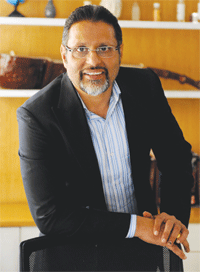 What prompted you to enter education?
What prompted you to enter education?
In the 1990s, the Indian economy was booming and parents were exploring new education options which ensured all-round development of children and youth. The lack of institutions combining international academic standards and Indian values was the driving force behind my entry into school and higher education. Moreover, I realised that knowledge is the key to development of the Indian economy.
What were your early challenges?
Making people accept new, unconven-tional education curriculums and the decision to include sports as an integral part of mainstream education were initial roadblocks hindering the realisation of my vision.
How did you overcome the challenges?
Fortunately challenges only strengt-hened my conviction. The JGI Group had a training and research centre for teachers set up long before I envisi-oned JIRS. The centre researched innovative pedagogies for new-age learning and aided the conceptual-isation of JIRS.
How helpful are the Central and state governments?
I did not face any problem while dealing with the government as we have always believed in abiding by rules and regulations.
Future plans. We intend expanding our educational institutes throughout India. Sixty percent of them are located in rural areas and 30 percent in urban India. We believe in facilitating incl-usive economic develop-ment, by providing educ-ational opportunities in both rural and urban areas.
Unwind/de-stress. I find interacting with students is a wonderful way to de-stress. It leaves me feeling rejuvenated.
Gagan Goyal
ThinkLABS, Mumbai
A mechanical engineering graduate of IIT-Bombay, Gagan Goyal is founder of ThinkLABS Technosol-utions Pvt. Ltd (estb. 2006), a Mumbai-based company offering hands-on science and robotics education to 300 schools and 25 colleges across 88 cities countrywide..gif)
What prompted you to start ThinkLABS?
As a student at IIT-Bombay, I participated in several national level robotics competitions and also repres-ented my college at an international contest organised by the prestigious American Society of Mechanical Engineers, New Orleans, USA. There I realised that robotics was much beyond a hobby in the US. It was used as a project-based learning tool for students of class IV onwards for science, technology, engineering and mathematics (STEM) education.
After quitting HPCL in 2006, I put together Rs.1.5 lakh from my savings and with the help of some of my IIT batchmates, developed robotics kits and started organising training programmes in engineering colleges. Impressed, the incubation cell at IIT-B gave me a soft loan of Rs.10 lakh. Subsequently in January 2008, we got the first round of funding from Seedfund. Around this time, we also decided to venture into the K-12 space with experiential learning programmes in robotics and hands-on science. Today, we have a team of 100 people.
What were your major early challenges?
During the initial years, the major challenges were to get the business model right, convince schools to introduce robotics education, and thirdly, attract the right talent to scale a start-up.
How helpful/enabling are the Central/state governments?
Quite a few state governments have shown interest in our programmes. Currently we are at an advanced stage of discussions with a state government to set up robotics labs in all its schools.
Future growth and development plans.
ThinkLABS is preparing to scale up rapidly with the help of alliance/channel partners in India and abroad. Recently, we tied up with Tata Interactive Systems and Next Education to leverage their reach in setting up robotics labs in schools across the country. We also plan to substantially increase our global footprint this year by roping in business partners from overseas.
Unwind/de-stress. My daughter. Socialise with family and friends
Dr. Bijoy Kumar Sahoo
SAI International, Bhubaneswar
Dr. Bijoy Kumar Sahoo is founder-chairman of SAI Group of Institutions, Bhubaneswar, comprising the K-12 SAI International School, SAI-Angan (playschool) and SAI International College of Commerce & Economics with an aggregate enrollment of 2,700 students. A qualified chartered accountant with a doctorate in commerce from Utkal University, Sahoo is a serial entrepreneur.
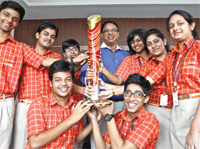 What prompted you to start SAI International?
What prompted you to start SAI International?
After practicing for 25 years as a chartered accountant, I realised my true passion was education, and that it was access to quality education that enabled me to achieve success. The desire to share the gift of education motivated me to promote SAI International in 2008.
What were your major early challenges?
The biggest challenge was to acquire land to give shape and form to my dream project. Funding was also a big hurdle as greenfield education institutions are capital-intensive projects and banks are not very helpful. Lack of quality teachers was another stumbling block.
How did you overcome the challenges?
My determination to realise my dream made me knock on the doors of many government departments and after ten years of effort, I acquired the desired land. To convince bankers of my bona fides, I had to mortgage everything — my house, jewellery, and all my life’s savings.
How helpful are the Central/state governments?
It took me years to convince the decision makers in government. But although it took time for them to understand, once convinced they were helpful and supportive.
Future growth and development plans.
My road map for 2020 is to promote a chain of 50 SAI Angan playschool-cum-daycare centres and establish five more branches of SAI International in Bhubaneswar. I am also in the process of setting up a fully residential co-ed school and a residential-cum-grooming school for girls in Odisha. Our ultimate aim is to establish a SAI International University.
Unwind/de-stress. Going on adventure trails and interacting with students. Spending time with family, travelling, reading, cooking, and listening to music.
K.E. Harish
Sadhbhavana Holdings, Kerala
A political science and education postgraduate of the University of Calicut, K.E. Harish began his career in Saudi Arabia as an administrative officer in the US-Saudi Joint Commission on Economic Cooperation (1992-1998). In 1999, he returned to India to take charge as principal of the CBSE-affiliated WMO English Academy in Wayanad, Kerala. In 2006 Harish was appointed CEO of Sadhbhavana Holdings Pvt. Ltd, a company started by several UAE-based NRIs to promote and manage new townships and international schools in south India. The company’s first venture, Sadhbhavana World School, Kozhikode, admitted its first batch in 2008. Currently this CBSE and IGCSE (UK)-affiliated K-12 school has 400-plus students and 50 teachers.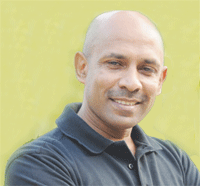
What prompted you to start Sadhbhavana World School?
Our objective was — and is — to bring best management practices into schooling, with the hope of changing the profile of the teachers’ community and professionalising school education.
What were your major early challenges?
Our first obstacle was land acquisition. The 56 acres of land we own was acquired after negotiations with more than 60 owners. Our master plan developed by STUP Consultants, took one long year to be approved by the chief town planning officer. Another hurdle was the five-year wait to get an NOC (no objection certificate) from the state government which is mandatory, and the non-availability of quality teachers in our tier-II city.
How did you confront these challenges?
We spent a lot of time educating and keeping our stake-holders up to date about the stumbling blocks and our response to negotiate them. Externally, through persistence and fair-dealing, we gained the public’s trust and confidence. In short, through dogged persistence, we overcame all problems. Currently we are sailing in calm waters.
What are your future plans?
From the Sadhbhavana World School we have grown into Sadbhavana Holdings Pvt. Ltd. We plan to promote a chain of K-12 schools and early childhood education centres. As our experience has shown, establishing greenfield schools is almost impossible. Currently we are negotiating the takeover of five schools in Kerala.
Unwind/de-stress. My hometown Kalpetta is my unwind destination. I enjoy the sounds of nature and reading.
Prajodh Rajan
EuroKids International, Mumbai
A business management graduate of Madras University, Prajodh Rajan began his professional career as a sales and marketing manager prior to signing up with the Mumbai-based EuroKids International Pvt. Ltd, a joint venture between Indian Express (Bombay) and Egmont International Holdings, Denmark, in 1999. When the company ventured into the education services segment, Rajan was appointed to lead the franchised initiative of EuroKids preschools. In 2004, when Egmont International exited India following a management buyout, Rajan was appointed director and chief executive of EuroKids International which promoted its first two preschools in Mumbai in 2001. Since then EuroKids has grown into a franchise network of 800 preschools in 311 towns and cities countrywide.
.gif) What prompted you to start EuroKids?
What prompted you to start EuroKids?
In 2001, our initial objective was to provide high quality content to preschools. But we discovered there was an opportunity to move beyond content provision to offering infrastructure, content, training and delivery.
How satisfied are you with the progress of EuroKids?
We started with two preschools in Mumbai in the year 2001. Now EuroKids International has a network of more than 800 preschools in 311 towns and cities countrywide, with a significant presence in Nepal, and a recent venture in Bangladesh. Over the past decade, EuroKids has touched the lives of more than 200,000 young children, mentored by more than 5,000 teachers and 4,000 caregivers.
How helpful/enabling are the Central/state governments?
The early childhood educ-ation (ECE) segment is not regulated currently and most preschools and ECE centres are self-regulated. The Central government has recently drafted guidelines to regulate this segment, but the real issue which greatly affects preschools is unavailability of qualified and trained teachers. The government should focus on providing the requisite infrastructure and teacher training.
Future growth plans.
EuroKids is expanding in tier II-III towns. We are also in the process of promoting enrichment progra-mmes in phonics, maths, science, music for children aged between 3-10. Recently we have also ventured into online teacher training for ECE professionals and the K-12 segment with EuroSchool. Currently we have ten EuroSchools in six cities.
Unwind/de-stress. Reading non-fiction and spending quality time with the family.
Saumil Majmudar
EduSports, Bangalore
An alumnus of IIT-Bombay and IIM-Bangalore, after a three-year stint with Wipro Technologies, Bangalore-based Saumil Majmudar became a serial entrepreneur. In 1999, he promoted QSupport, India’s first remote consumer tech support company, and SportzVillage (2003) which provided sports training and play facilities to children, prior to promoting EduSports Pvt. Ltd (2009) to offer “holistic education through sports’’. Currently 200,000 children in 330 schools in 85 cities are subscriber students paying Rs.100-200 per month to EduSports to receive sports education and training..gif)
How satisfied are you with the progress of EduSports?
Fairly satisfied. The early years were tough but now things are gradually falling into place. Many opportunities are opening up now that EduSports has established a good public reputation. During the past four years, we have created a new pedagogy for sports education which has favourably impressed 330 school leaders, and 400,000 parents to accept sports as an integral component of education.
What are the major constraints to the growth of EduSports?
Availability of high quality training professionals. Moreover, there are many parents who still don’t acknowledge the importance of sports in the education process.
How helpful are Central and state government policies?
Examination boards are beginning to accord PE (physical education) and sports training greater importance. Under CBSE’s continuous and comprehensive evaluation (CCE) programme, schools are being held accountable for the quality of sports experiences provided to all children.
What are your future plans for EduSports?
We have drawn up a plan to sign up 1,000 schools with over 1 million students.
Unwind/de-stress. Karate, badminton, soccer, occasional golf, reading and travel.
S. Thomas & L. Zacharias
Entab Infotech, Delhi
Shaji Thomas and Lawrence Zacharias are co-founders of Entab Infotech Pvt. Ltd (estb. 2000), a Delhi-based company offering ERP solutions to over 1,000 education institutions in India and abroad. An alumnus of Aligarh Muslim University who began his career as a teacher and moved on to promote a computer education and training company, Thomas supervises its business operations. Zacharias, an electrical engineering graduate of AMIE, Kolkata, and former Indian Air Force officer, is managing director, spearheading the daily operations of the company.
&-Lawrence.gif) What prompted you’ll to start Entab?
What prompted you’ll to start Entab?
ST: We discerned a need for a consolidated ERP system in the education sector. This realisation and our passion for automation of services led to the development of Entab’s flagship product CampusCare. Our emphasis from the start was on continuous research and development, real time imp-lementation and prompt customer support. This helped to create a public image of an accountable and reliable company.
What were your major early challenges?
LZ: Lack of awareness and reluctance of education institutions to switch to automated systems, and poor computer literacy of academics and administrators.
How did you overcome these hurdles?
ST: Through repeated presentations and discussions with managements of education institutions, we convinced them of the need for automation and benefits of centralised, and easily accessible repositories of information.
How helpful/enabling are the Central and state governments?
LZ: Our clients are mainly private sector institutions where decisions are taken fast. This is not the case with government projects.
Future growth and development plans.
ST: Entab is in the process of developing and launching new and attractive features to enable schools and teachers to focus on quality education. We are also developing mobile application technology and a multilingual supporting system, and will shortly make our services available on mobile phones.
Unwind/de-stress. LZ: Physical exercise, badminton, yoga, and spending quality time with family.
ST: Newspapers, TV news, morning walks, and weekend outings.
Vinay Jain
Witty Group, Mumbai
Vinay Jain is founder-CEO of the Witty Group of Institutions comprising three K-12 Witty Kids schools –– one in Mumbai and two in Rajasthan, Witty Institute of Teachers Training with an aggregate enrollment of 2,700 students, and VJTF Eduservices Pvt. Ltd, a training and education consultancy company. A graduate of SBH Medical College, Aurangabad, Mumbai-based Jain is also a well-known motivational speaker who has conducted over 350 seminars and workshops for parents, teachers and students countrywide..gif)
What prompted you to start Witty Group?
As a motivational speaker and trainer, I believe in imparting informal education rather than curriculum-based learning. Establishing my first school was the best way to translate my ideas and concepts into action.
What were your major early challenges?
Land, infrastructure and capital.
How did you overcome these challenges?
I believe there is never a perfect starting point. We initiated our first education venture in a small area of 200 sq. ft with virtually no capital. Our first Witty Kids school was started in a residential building with small rooms. Instead of cribbing, we converted our weakness into strength and enrolled only 10 children per class. This became our biggest USP. Soon we began to receive good notices for paying individual attention to students.
Likewise, we could raise capital from well-wishers, investors, parents and financial institutions as we were transparent and honest in all our dealing. We never focused on the competition but always encouraged our team to deliver their best to customers. Inevitably success followed.
How helpful/enabling are the Central and state governments?
Establishing an institution in a land-starved city like Mumbai is not an easy task. The civic administration, bureaucracy, procedural systems and policies, sanctions, approvals and permissions are not friendly for education entrepreneurs. New proposals take upto two-three years to receive sanction from the state government.
Future growth and development plans?
We have seven new school projects in the pipeline, which we hope will be operational by 2014-16.
Unwind/de-stress. Make sure of a family vacation every six months. I also enjoy motivational speaking.
Nipun Goenka
G.D. Goenka Group, Delhi NCR
An alumnus of the Warwick Business School and Chartered Institute of Marketing (UK), with six years of work experience in the US and India, Nipun Goenka is the managing director of the G.D. Goenka (GDG) Group of pre-primary to university education institutions. Currently GDG Group has 35 (including the state-of-the-art IBO (Geneva) and CIE (UK)-affiliated G.D. Goenka World School, Gurgaon (estb. 2004); the G.D. Goenka World Institute (2009) and G.D. Goenka University (2013)) institutions under its umbrella. Aggregate student enrollment: 20,000.
.gif) How satisfied are you with the progress of the G.D. Goenka Group?
How satisfied are you with the progress of the G.D. Goenka Group?
Very satisfied. We will complete 20 years in 2014. From a humble start in 1994, we have become trendsetters in secondary education and one of the largest school chains in India. Moreover, we have successfully promoted internationally benchmarked institutions of higher education. Our G.D. Goenka World Institute awards the engineering and business management degrees of Lancaster University, UK. Likewise G.D. Goenka University which offers degree programmes in business mana-gement, engineering, design and hotel management has signed academic collaboration agree-ments with the Politecnico di Milano — Italy’s top design school — and the French culinary school Le Cordon Bleu.
How helpful are the Central and state governments?
The Haryana state government in particular, has been very helpful and cooperative in setting up G.D. Goenka University.
What are your future plans for GDG Group?
We intend to multiply the number of preschools, primary and secondary schools across India, introduce more professional streams in G.D. Goenka University, with special emphasis on vocational education, and establish a sports academy in G.D. Goenka Education City, spread over 60 acres in the foothills of the Aravali hills, on the Sohna-Gurgaon Road.
Unwind/de-stress. Exercise, cycling, and pet care.
Rohan & Rohit Bhat
Children’s Academy, Mumbai
A commerce and education graduate of Mumbai University, Rohan Bhat is chairman and Rohit Bhat, CEO of the Mumbai-based Children’s Academy Group of schools. Currently the three K-12 state board-affiliated schools of the Children’s Academy Group, which are now switching their affiliation to the Delhi-based CISCE, have a combined enrollment of 9,583 students mentored by 383 teachers.
What’s the history of the Children’s Academy Group?
Rohan: Our first school, founded by my late father V.V. Bhat, was started with a complement of 85 students and four teachers in 1970. I was appointed as a clerk in the school in 1982. After I completed my B.Ed I rejoined the Children’s Academy in 1988 as a trained assistant teacher. Following the demise of my father in 2001, I succeeded him as chairman of the Children’s Academy Group and together with my brother Rohit, a fellow trustee, supervise its operations.
How satisfied are you with the progress of the Children's Academy?
Rohan: Very satisfied. Today our three schools in Malad, Kandivali and Thakur Complex have a combined enrollment of close to 10,000 students. Moreover, our students are competing at district, state and national levels and bringing in a constant flow of trophies, medals and certificates.
Rohit: We have fulfilled our father’s dream of providing quality, affordable education to children. All our schools deliver excellent IT-enabled education, a range of co-curricular activities, and qualified teachers.
How enabling are the Central and state governments?
Rohan: Government policies may be well-meaning, but my personal experience is that they are counter-productive. I hope the state governments will invo-lve principals in their decision-making processes so they can be more rational and practical.
Rohit: Government must work at green-lighting affordable schools that provide quality education. This is a better alternative to the mushrooming high-end schools whose high fees strain middle class parents’ pockets.
What are your future plans?
Rohan: The latest 2013 EducationWorld survey has ranked Children’s Academy, Malad #12 among all Mumbai schools. Our immediate priority is to see all our schools within the Top 10. We also intend to start a new school in Vasai affiliated with CISCE and Cambridge International Examinations (UK) boards.
Unwind. Rohan: Philately, reading fiction, travel.
Rohit: Movies, swimming, long walks.
Amol Arora
Shemrock & Shemford Schools, Delhi
Amol Arora, an engineering, business management and education graduate of the Delhi School of Engineering, the University of California and Nottingham University, is managing director of the SHEMROCK and SHEMFORD Group of Schools which manage a chain of 225 preschools and 45 K-12 schools across the country and abroad.
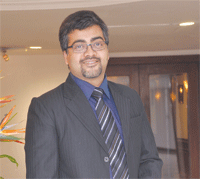 What prompted you to start the Shemrock/Shemford schools?
What prompted you to start the Shemrock/Shemford schools?
The Shemford schools, run under the franchise model, are a natural extension of the 225 Shemrock preschools promoted by my parents Dr. D.R. Arora and Dr. Bimla Arora in 1989. An informal survey indicated that a large and growing number of parents wanted the stress-free education of Shemrock preschools in primary-secondary education as well. Therefore we promoted the first Shemford School in 2009 with the same liberal teaching-learning philosophy.
What were your major early challenges?
The initial years were difficult as we didn’t have a working model for our first Shemford School. But we had the advantage of a wonderful research team. The first few franchisees were signed up on the basis of the experience and good reputation of our Shemrock preschools. But once we demonstrated our support system, we experienced a rush of franchise applications for Shemford.
What was your response to these challenges?
The first two schools which signed up with us were developed as model institutions. Since then, in a span of only four years 45 Shemford schools with an aggregate enrollment of 10,000 students and 600 teachers are operational in 40 cities and 14 states across the country, a record recognised by the Limca Book of Records.
How helpful/enabling are the Central and state governments?
We ensure that government rules and regulations are carefully followed, and that our schools satisfy the norms prescribed by the examination boards.
Future growth plans?
We have set a target of multiplying the number of Shemrock preschools to 450, and Shemford schools to 100 over the next three years.
Unwind. Travelling and spending time with my son.
Dr. Rohini Ahluwalia
Ahlcon Schools, Delhi
Dr. Rohini Ahluwalia is trustee of the Shanti Devi Progressive Education Society which has promoted the Ahlcon International and Ahlcon Public schools in Delhi with an aggregate enrollment of 6,000 students instructed by 300 teachers. A medical graduate of Banaras Hindu University, Dr. Ahluwalia served as CEO of Ahlcon Parenterals (India) Ltd (2006-12), a publicly listed pharmaceuticals company of which she is currently a full-time director.
What prompted you to start Ahlcon International School?
Our first was the Ahlcon Public School in Mayur Vihar, Delhi, promoted in 1988. A decade later we realised the aspirations of parents had changed and they were looking for progressive, broad-based holistic education supported by excellent infrastructure. Thus with the objective of providing children in East Delhi globally benchmarked, experiential, project-based education rooted in Indian values, we promoted the Ahlcon International School in 2001.
What were your major early challenges?
We had our share of teething problems. Deviations from conventional teaching-learning pedagogies, integration of technology, emphasis on music, art, and sports were new ideas which parents were initially uncomfortable with. However, it did not take long for them to support us. In less than a decade, we are ranked #1 in East Delhi by most surveys including EducationWorld India School Rankings 2013.
How did you overcome these challenges?
MGRM Net, a US-based technology solutions provider, offered us an excellent school management system that gave us an edge over others in terms of decision-making and introducing transparency and accountability. Other differentiators were emphasis on sound values and strong international linkages.
How helpful/enabling are the Central and state governments?
Well to the extent that the Delhi gover-nment allotted us land, I am thankful.
Future growth and development plans.
Two more Ahlcon schools in Delhi NCR are scheduled to admit their first batches in 2014. We are also planning to foray into teacher training and vocational education. Moreover, next year, through a partnership with MGRM Pinnacle we will give our students a unique oppor-tunity to acquire CBSE as well as US school certification.
Unwind/de-stress.
Yoga, meditation and interacting with children.
Dr. Haresh Tank
Station-e Info Services, Rajkot
Dr. Haresh Tank is founder-director of Station-e Info Services Pvt. Ltd, a Rajkot (Gujarat)-based company which has established skills development centres and Station-e language labs in nine states countrywide, and has trained over 100,000 people in life and soft skills development..gif)
What prompted you to start Station-e Info Services?
Employability of students was a big concern. I noted that many talented graduates with subject knowledge were unemployable because of lack of English proficiency and other soft skills. This prompted me to promote a venture which would help students develop English language communication and soft skills development.
What were your major early challenges?
There were no major impediments, only a phase of orienting and sensitising stakeholders about the importance of English communication and soft skills for employment. Fortunately for us, we got a lot of word-of-mouth publicity from the initial batches which completed training. The response from all stakeholders including students, professionals, teachers, and administrators was very positive and encouraging.
How helpful are the Central and state governments?
I owe sincere gratitude to the Central and state governments for their support. Every time we met a minister, a policy maker or top bureaucrats, Station-e was welcomed and given all cooperation.
Future growth plans.
We want to reach out to more institutions and students, and include computer skills and vedic maths in our menu.
Unwind/de-stress. Reading is a great way to switch off the world.
Manas Mehrotra & Niru Agarwal
Greenwood High, Bangalore
Manas Mehrotra (MM) and Niru Agarwal (NA) are trustees of Greenwood High which incorporates a K-12 and three preschools in Bangalore, and one preschool each in Nagpur and Kolkata with an aggregate enrollment of 3,300 students and 250 teachers. A chartered accountant with an MBA from Babson College, USA, Mehrotra worked with Ernst & Young before venturing into education, while Agarwal is an alumna of Assam University and director of the Sattva Group, a real estate development company.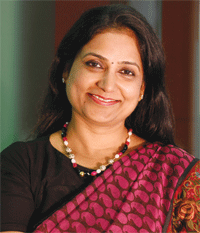
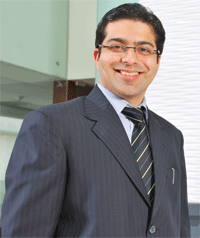
What prompted you to start Greenwood High?
MM: There is a huge demand within the middle class for high-quality school education delivered by committed educators. Our objective was to promote a school “rooted in knowledge”, equipped with modern infrastructure, delivering contemporary pedagogies while adhering to Indian values and culture. Greenwood High is a blend of the best of the present and past.
What were the major early challenges?
NA: People were initially apprehensive about a new school proclaiming new learning methods and pedagogies. Moreover, the school was located far from the city.
How did you’ll overcome these hurdles?
NA: It took determined and concerted efforts. We spent considerable amount of time researching and developing curriculums and pedagogies which are enjoyable, exploratory, analytical and in line with best education practices abroad.
How helpful/enabling are the Central and state governments?
MM: We are grateful for their cooperation and support.
Future growth and development plans.
MM: We believe in creating high-quality institutions. All our schools are sited on a minimum 12-15-acre campus and equipped with modern infrastructure and facilities. Currently we are building two new Greenwood High campuses in Bangalore –– on Bannerghatta Road and Sarjapur Road — and one in Salt Lake, Kolkata.
Unwind. NA: Yoga, meditation and morning walks.
MM: Spending time with family and watching films.
Aakash Chaudhry
Aakash Educational Services, Delhi
Aakash Chaudhry is executive director of the Delhi-based Aakash Educational Services Ltd (AESL), a low-profile entrance exams and test prep company which runs 76 learning centres (of which 45 are owned) across the country for 85,000 students. Endowed with a blue-chip education (Harvard Business School and Indian School of Business, Hyderabad), Chaudhry came aboard AESL (estb. 1988) in 2006 after promoting an advertising production company (Quantass Associates), and brief stints with IT majors Infosys Technologies and Cognizant Solutions.
 What’s the history of AESL?
What’s the history of AESL?
My father, J.C. Chaudhry, the founder-chairman of the company, was a biology teacher who began part-time tutoring at our home in 1988. Soon after, he promoted the Aakash Institute for coaching classes XI-XII students for medical college entrance exams. By 1994, the institute had established a reputation in Delhi as a leading PMT (pre-medical test) coaching centre. In 1997, it began offering PMT test prep services through the distance education mode and a decade later, IIT-JEE coaching followed. In 2010, we blended technology platforms into our coaching programmes.
How satisfied are you with the progress of AESL?
We have been running the institute smoothly for the past 25 years. During this period, Aakash Institute has acquired an excellent reputation for teaching-learning innovations such as iTutor, a tablet-based coaching programme; alliance with India’s top DTH service provider, Bharti Airtel, for providing television tutoring in the form of on-TV assessment through Airtel digital TV; and virtual classroom centres in distant locations to help students access high quality affordable education. Now that we are well established in north India, we are focusing on expanding operations in the south. This year for the second consecutive year, AESL is a principal sponsor of the popular TV quiz show, Kaun Banega Crorepati to derive brand mileage and national publicity.
What are the future plans of AESL?
We will steadily expand our learning centres network, especially in south India. We have also made large invest-ments in technology — tablets, ERP, and by next year, we’ll make our content available on mobile phones.
Unwind/de-stress. Quality time with family, and watching movies.
Dr. Anand J. Verghese
Hindustan Group, Chennai
Dr. Anand Jacob Verghese is pro-chancellor of Hindustan University (HU), which was conferred deemed varsity status by UGC in 2008. An alumnus of US International and Huron universities (London) and Dongguk University, Seoul, Verghese is also director and CEO of the Hindustan Group of Institutions, which includes six higher education institutions with an aggregate enrollment of 12,000 students and 2,000 employees.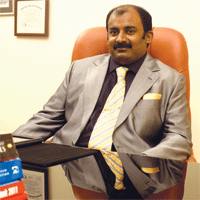
How satisfied are you with the progress of HU and Hindustan Group?
In accordance with the vision of our founder chairman, the late Dr. K.C.G. Verghese — “to make every man a success and no man a failure”, I am satisfied with the many initiatives we have taken to provide quality higher education in state-of-the-art, conducive learning environments. We have also signed up several collaboration agreements with reputed educational instit-utions in India and abroad, providing students with global exposure and learning opportunities.
What are the major constraints on the growth of the Hindustan Group?
Fortunately, we have had several decades of steady growth. But rapidly transforming pedagogies and technology, changes in state funding policies, and ever-increasing expectations of students and parents, are constraints on maintaining past growth rates.
How enabling are the Central/state governments?
The Central and state governments are supportive. Government rules and regulations set infrastructure, faculty, and academic standards.
Future growth and development plans.
Develop international alliances, provide financial and technical support to students and faculty to undertake research and innovation projects, and explore public-private partnerships in education.
Unwind. Aviation, travelling and motor sports
P.K. Gupta
Sharda Group, Delhi
An engineering graduate of Agra University, Pradeep Kumar Gupta who began his career as a civil contractor and manufacturer of technical equipment for education and research institutions, is the Delhi- based chancellor of Sharda Univ-ersity (Greater Noida) and founder-chairman of the Sharda Group of Institutions (SGI).
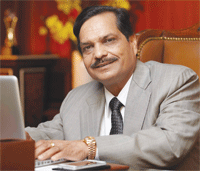 What factors prompted you to venture into education?
What factors prompted you to venture into education?
My business of manufacturing and supplying technical equipment to education institutions and research laboratories required me to travel extensively. During my travels, I observed that a large number of students were going from north India to the south for engineering and professional education. This prompted me to promote HIST (Hindustan Institute of Science and Technology) with comparable education infrastructure and facilities in Agra in 1996.
One year later in 1997 we promoted the Hindustan Institute of Management & Computer Studies (HIMCS). In 2009, the Uttar Pradesh government enacted a special legislation to confer university status upon HIST, now known as Sharda University, which has 11 schools of professional education. Currently SGI which includes Sharda University and HIMCS spread over 167 acres of state-of-the-art campuses in Agra, Math-ura, and Greater Noida, has an aggregate enrollment of 25,000 students mentored by 1,200 faculty.
How satisfied are you with the progress of SGI?
In SGI, we have a truly global outlook. Currently 10-12 percent of Sharda University students are from 41 countries, and there is a strong bond between the faculty, students and Indian industry which readily recruits SGI graduates.
What are your future growth and development plans?
We have drawn up a five-year perspective plan to establish Sharda University as the prem-ium professional education institution of Delhi/NCR, in which the ratio of domestic to overseas students will be 1:1.
Unwind/de-stress. Meditation, reading, and travel.
Deepikaa Jindal
Jindal Stainless Foundation, Haryana
An alumna of Calcutta University (Loreto House), Deepikaa Jindal is chairperson of the Jindal Stainless Foundation, O.P. Jindal Cancer Hospital, N.C. Jindal Institute of Medical Care & Research and O.P. Jindal Modern and Vidya Devi Jindal schools, with an aggregate enrollment of 4,540 students mentored by 283 teachers. Vidya Devi Jindal School, Hisar, an all-girls boarding school (estb. 1984), is ranked #7 nationally and #1 in Haryana in the Education-World India School Rankings 2013.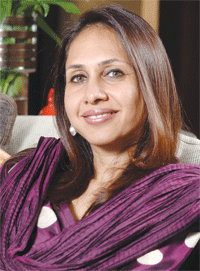
What’s the history of the education institutions of the Jindal Stainless Foundation?
My late father-in-law Shri O.P. Jindal wanted to build a top quality educational institute in Haryana to provide education to girls in a safe environment. His vision translated into the Vidya Devi Jindal School (VDJS) in 1984. With more than 800 boarders, VDJS is one of the largest residential schools for girls in the country. The foundation also promoted the co-ed O.P. Jindal Modern School in 1997 which has over 3,800 students.
What is your role as chairperson of these schools?
I have been involved in the management of both schools since their inception, helping with designing curricula and infrastructure, financial planning, and selection of faculty. We have const-ituted management committees comprising prominent educationists, professionals, and foundation repres-entatives to provide guidance and support to these institutions.
How helpful and enabling are the Central and state governments?
Both the Central and state governments have been very helpful and cooper-ative. Their speedy approvals helped us get both schools up and running in quick time.
What are your future plans in education?
The Central government’s landmark Right to Education Act, 2009 has given tremendous impetus to corporate participation in community education. The Jindal Steel companies have been front-runners in promoting education and health centres at all plant locations. Moreover, due to pressure from the local community we will shortly be inaugurating a second co-ed day school in Hisar.
Unwind/de-stress. Spend time with family, read philosophy. I also enjoy attending short workshops on self- growth and development.